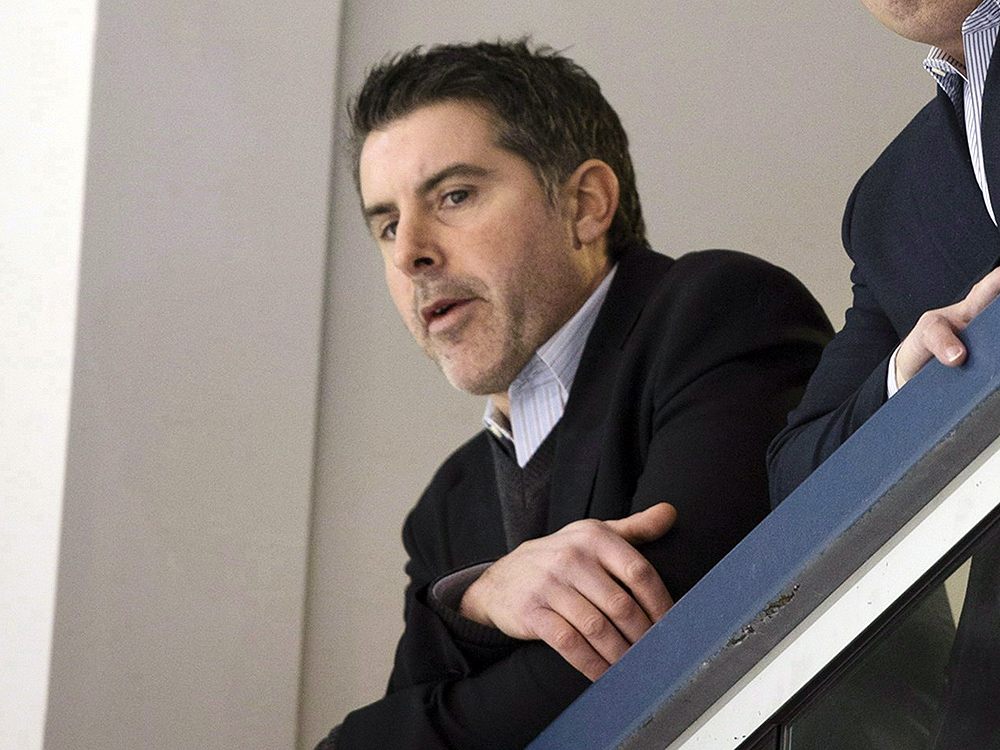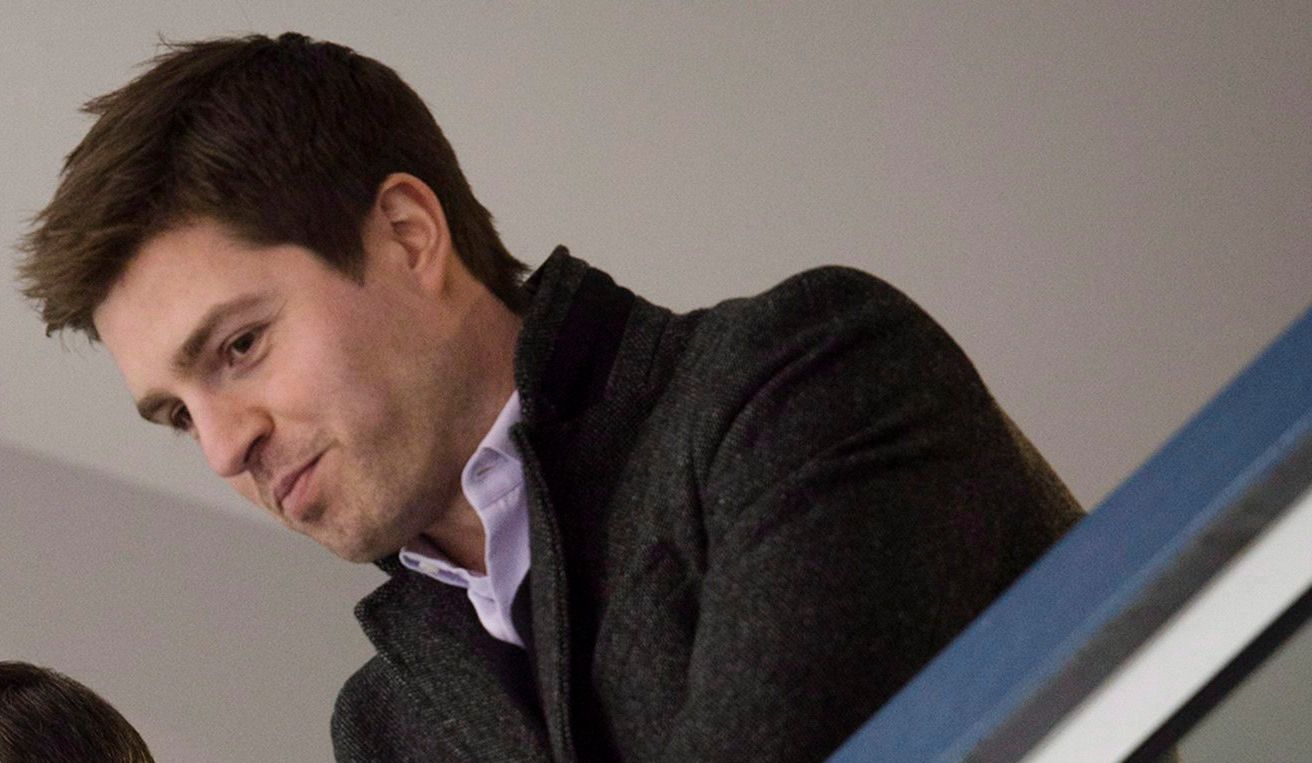Toronto Maple Leafs General Manager Kyle Dubas joined NHL Tonight this week to discuss the addition of Joe Thornton, the team’s cluttered depth chart, competition in training camp, the need for the club’s core players to lead the way, and why the team can’t wait and try to “flip a switch” at playoff time this season.
What was the sales pitch from you and the Leafs to bring a guy who seemed very comfortable out in San Jose to Toronto?
Dubas: We wanted to go through with him what we thought he could add to our group — in terms of his play, of course, and where he would fit with the group, but also in terms of his character and what he would bring to our locker room, and most importantly, the impact he can make on our young players. We thought it was a fit stylistically because he is one of the top passers of his generation and, really, one of the top passers of all time. His statistics speak for themselves. Even as he gets up there past 40, he has still shown the ability to make plays and drive play up the ice.
I think he will be a fit with our guys, especially because of the prowess we have in terms shooting, especially in terms of our center-ice position with Matthews and Tavares. Off the ice, we think it is going to be a great fit and has been already in terms of what he has brought to the group with regards to who he is as a person. I just think his spirit that he has day in and day out, and his love for hockey, has been a big help. We are excited about Joe.
At the end of the year, you talked about getting tougher to play against. How do you envision that on your team in terms of how you play, and how do these new players help you accomplish that?
Dubas: What we found with our team last year, and even going back to 2015-16 and 2016-17 — when we made the playoffs for the first time — is that we wait. We wait for the other team to kind of dictate the terms to us, especially at key moments. Just to use this year as an example, whether it was Game 1 against Columbus or Game 5 against Columbus, we’ve just felt that we sat back a bit too much and we didn’t really dictate play. We waited for Columbus to strike first, and we were on our heels and had to react.
With regard to competitiveness and physical play, we wanted to add that element. We feel Wayne and Zach Bogosian did that. We are also aware that you can’t just add one or two guys who play physical and expect it is going to change the entire group. Our own players have to become a little bit more competitive with their mindset going into every game of the year and into the playoffs.
We also wanted to add guys to the group who had a little bit of urgency and had a lot to prove or whose time was running out to win — with Spezza and Thornton and even Simmonds, Bogosian has just been through the playoffs for the first time and won, and then others like Vesey who have a lot to prove and are looking for a chance to rebound. We wanted to add that element to the group and we hope it makes us a more urgent group — to change our mindset to be a little more proactive rather than reactive.
From what we have seen so far with the interactions among the group — we won’t know until we get into the actual training camp and regular season — we have been happy with what we have been able to do, but we realize that we have got to get into competition and see it come to fruition there.
The team is right up against the flat salary cap this year. How creative have you had to be? How creative do you have to be moving forward to make everything work in uncertain circumstances?
Dubas: That usually falls to Brandon Pridham, our Assistant General Manager. The work that he has done in our years together — we started together in 2014 — has just been remarkable. When we were a rebuilding club, his guidance in letting us accrue some assets by taking on players from other clubs was immeasurable and helped us to kind of build the foundation of the team. Now, with the work he has done in terms of really helping us navigate through the summer and who we had to move and what we were able to do and add to the team, he has just done a great job in building us out a number of routes we can go down.
We feel good about where we are. We won’t have to be in Long Term Injury Reserve for the first time in a number of seasons. We will be able to kind of get these last free agents done and then start to move into the year.
Like most teams, we will be close to it, but with the planning that has gone into it, we feel good about where we are at now.

You’ve got eight or nine forwards at the bottom of the roster who could play in the NHL. Are you going to be able to carry 23 guys or is it going to have to be 22 or 21 or maybe even 20? With the uncertainty of the AHL season, how are teams going to navigate those waters?
Dubas: A lot of that is still so uncertain in terms of taxi squads and what it is all going to look like at the American Hockey League level. We will rely on the NHL for guidance on that. They will do a great job as they did with the Return to Play in the summer and getting us all set.
As it pertains to the players that are there, we look forward to the competition in training camp. We will go with the players that earn it in camp. We were looking to create that urgency in training camp and that added competition in camp to make guys really focus during the offseason on being in the best condition and shape that they can be. I know that is a cliche in sports, but when there is no competition, I think it is hard to really hammer that point home.
The players that are in competition now should look at the depth chart and say, “Geez, if I don’t come in in the absolute best spot I can be in, or if I take a day or a couple of days where I am not really committed to my offseason routine, there is not just one or two guys, but three or four or five guys I am in competition with that are probably working.”
We think that will help our team. As we saw in the playoffs this year just with the number of injuries — whether it is a team like Dallas or even Tampa, Colorado faced the same thing also — you need to have depth and you need to have guys that are able to step up and play and contribute to your club. We have a good mix in that area. We have some of our own younger guys and we have some more veteran players that can serve in that role and have a lot to prove.
We will see how it goes in training camp. We will go with the players that earn it, and then we will utilize whether it’s the Marlies or a taxi-squad type of situation — whatever we are allowed to do — to maintain our depth that way.
The young core that the team is built around — how much of a step forward do you need to see from those guys if this team wants to ultimately take that next step forward? With Matthews, Tavares, Nylander, Marner, what do you expect from them coming up?
Dubas: Certainly, Auston, in the playoff series against Columbus, showed what he is capable of. We are excited to see it again in a full season. He turned 23 just after we got out. There is still a lot of growth that he can show. He works hard at it. He wants to be a great player. He is scoring at a high level. His defensive side of the game has continued to come along under Sheldon. We are really excited about where he is at.
With regards to Nylander, I thought he took big steps this year. We look forward to continuing to see him continue to grow.
Mitch — the contract situation at the beginning, we wish we had it done for the start of training camp, and then he had the high-ankle sprain in early November that he was off for a month with. He couldn’t really regain — for a few weeks or a month after he got back — his full capacity. But he brings a lot to our group in terms of talent and playmaking. We expect he will be at the top of his game as we return.
We have also got John Tavares as well. I think a lot of the attention gets spent talking about the depth players and their contributions in the playoffs, but in looking at Tampa Bay and Dallas this year and the teams that took long runs, your core guys have to be at their best through the regular season and into the playoffs. We need all of them, on the forward group and the backend and in net, to be at their best if we are going to really do some damage come playoff time.
That just doesn’t start by getting to the playoffs and flipping a switch. It starts with what we are doing now in the offseason and what we do in the regular season to put ourselves in a good position come playoff time.
Those guys are going to be the ones who drive it. We are just trying to complement them as best we can around the edges and get the players that can serve in complementary roles and boost them as much as possible.































